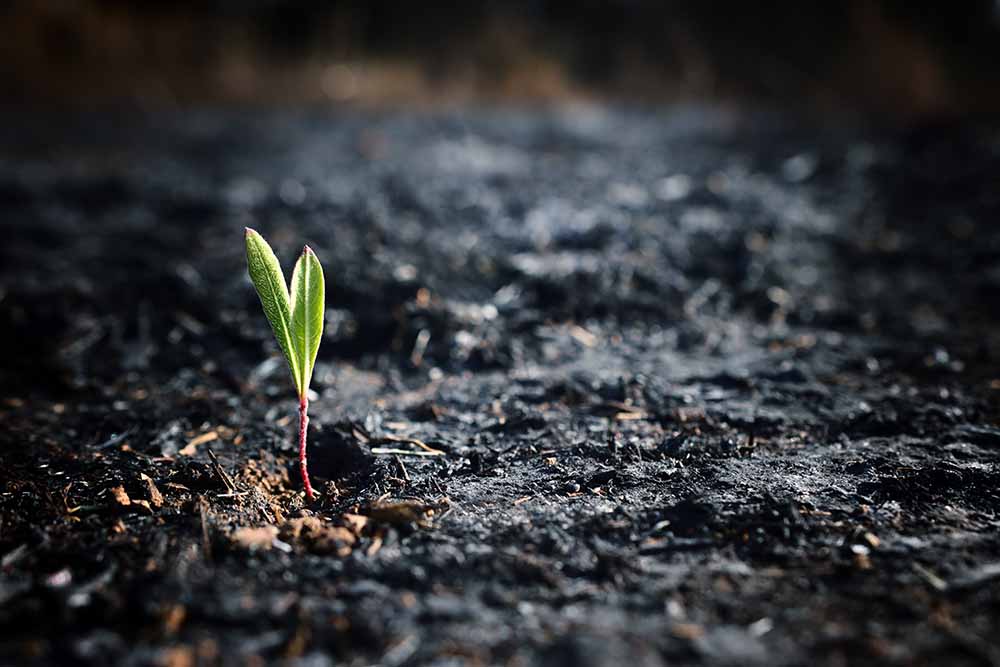The impact of natural conditions on our soils
In this blog, we explore how vermiculture products can aid in soil recovery from adverse weather events and serve as a buffer against future environmental stresses. Discover the benefits of incorporating vermiculture into your soil management practices to enhance resilience and sustainability.
Whether we like it or not, our soils are continually exposed to extreme natural conditions such as drought, heat, fire, and floods. These environmental stresses can significantly impact the structure, assembly, and function of the soil microbiome (microorganism community). Vermiculture products not only help build resilience against these events but also serve as a valuable tool for recovery.
How do weather events impact soil microbiomes?
There is still much to learn about the impacts of weather and climate on soil microbiomes. However, long-term observations and artificial testing have shown that heatwaves and droughts can bring about the following changes in soil:1,2
- Changes in composition of microbial communities (including fungi and viruses)
- Reduction in soil microbial activity and biomass
- Changes to nutrient cycling processes as a result of changes in the production of enzymes and proteins produced by soil microbes (increased abundance of gram-positive bacteria that break down nitrogen compounds, which can increase ammonia oxidation)
- Increase in pathogenic fungi
- Denature amino acids (impacting the structure and function of proteins)
Major bushfire events in Australia have led to the collection of valuable data and observations about the impacts of fire on soil:
- Chemical, physical, and biological processes
- pH and nutrient availability
- Hydrophobicity (repelling water)
- Erosion
- Loss of organic carbon and nutrients
- Loss of soil structure
- Sterilisation – loss of microbial and soil organisms (including invertebrates)
Even fires at low temperatures (< 120°C) reduce soil microbial biomass and therefore soil respiration. The effect is greatest close to the soil surface4
Why is soil microbial balance so critical to soil resilience?

The activities carried out by the organisms below and above the soil surface are critical in the chemical, physical, and biological processes of the soil. They play key roles in nutrient cycling, soil structure, disease suppression, plant growth promotion, and carbon sequestration.
Healthy soils absorb water, store and release nutrients, filter pollutants, provide a substrate for plants, and create a habitat for microbial communities that drive critical nutrient processes.4
Building healthy and diverse microbial communities help maintain soil functions and improve resilience under adverse conditions.
How can vermiculture help recover soils from weather events?
Management of soil recovery after a fire will be dependent on the type of soil, farming system, fire intensity, subsoil moisture availability, and the anticipated weather prior to the next land management activity.3 Preventing soil erosion and establishing groundcover/vegetation is key. Mulching, fertilisation, clay incorporation, and water control measures all play roles in recovery from fire, depending on the severity.5
Vermicompost has the potential to aid soils in their recovery from fire. In addition to plant-available nutrients, vermiculture products contain components that support soil functions, including:
- Nutrient Cycling:Microbes decompose organic matter, releasing essential nutrients back into the soil, ensuring that plants have access to the nutrients they need for growth.
- Soil Structure Improvement:Vermicompost improves soil structure, making it more porous and enhancing water retention. This is particularly helpful in drought recovery as it helps the soil retain moisture better.
- Nutrient Enrichment:Both vermicompost and vermiwash are rich in essential nutrients, growth hormones, and beneficial microbes. These nutrients help rejuvenate the soil and promote plant growth.
Enhanced Microbial Activity:The microbial activity in vermicompost and vermiwash helps break down organic matter, improving soil fertility and aiding in the recovery process.- Disease and Pest Suppression:Vermiwash has biopesticide properties that can help control soil-borne diseases and pests, which is crucial for restoring plant health after a fire or heatwave.
- Organic Carbon Sequestration:Vermicompost helps sequester organic carbon in the soil, which can improve soil health and resilience against future environmental stresses.
What can I do to minimise my risk to different weather events?
Improving soil health through the use of vermiculture products such as NutriSoil Biological Solution and NutriSoil Castings can help buffer your soils and farming system from weather events.
Through the use of NutriSoil products and regenerative farming practices, you can make gradual changes to the structure and function of your soil, building natural resilience:
-
- Increase the diversity and abundance of soil organisms
 Increase the organic matter under the surface by growing bigger roots
Increase the organic matter under the surface by growing bigger roots- Improve water infiltration
- Increase soil carbon and water holding capacity
- Grow healthier crops with greater resilience and tolerance to extremes
If you have been impacted by fire or drought, give the NutriSoil team a call to discuss your strategy to rebuild your soil health.
- https://www.sciencedirect.com/science/article/abs/pii/S1164556311000847
- https://www.nature.com/articles/s41396-023-01470-5
- https://www.csiro.au/en/news/all/articles/2020/may/soil-fire-recovery
- https://www.publish.csiro.au/ebook/chapter/9781486316656_08
- https://www.soilscienceaustralia.org.au/wp-content/uploads/2020/01/202003-FACT-SHEET-Soil-fire-impacts-and-management.pdf

